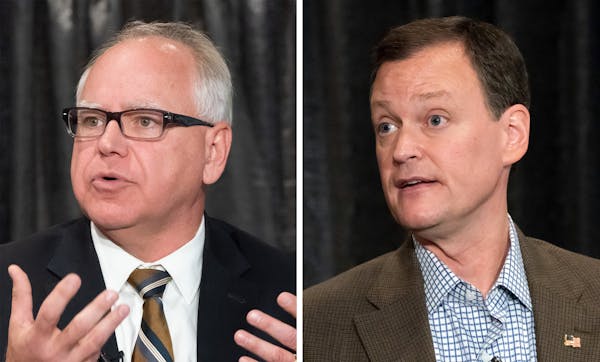Candidates for governor Jeff Johnson and Tim Walz both earn well above the median household income of their fellow Minnesotans, but an accountant who reviewed their tax returns said he found nothing unusual in either.
Johnson, a Republican and a Hennepin County commissioner from Plymouth, shared his 2017 tax return at the Star Tribune's request. Walz, the Democratic candidate and a U.S. congressman from Mankato, released 11 years of tax returns earlier this year.
"Both are reasonably similar. And neither is particularly interesting," said Chris Wittich, a CPA with Boyum Barenscheer, an accounting firm based in Bloomington.
Although the Johnson and Walz households both earn incomes higher than average, the two families are mostly wage earners, and neither uses exotic deductions or fancy maneuvers to avoid paying taxes.
Jeff and Sondra Johnson together made about $254,000 in 2017. Tim and Gwen Walz's combined income was about $212,000 in 2017.
The median household income in Minnesota is about $72,000; in the United States it's a bit more than $61,000.
Walz and Johnson both draw government salaries from their elected jobs. Sondra Johnson works in the financial services industry, while Gwen Walz is an educator.
Their conventional tax returns stand in contrast to Gov. Mark Dayton, whose income is derived from a vast family fortune. Nor will Minnesota's next governor be anything like President Donald Trump, who is the first major presidential candidate in decades to decline to share his tax returns with the public.
Johnson made more than $113,000 for his work on the Hennepin County Board, where he has served since 2009. He also earned fewer than $9,000 as part of his labor law practice.
The Johnsons paid $42,464 in total federal taxes, for an effective tax rate of just shy of 17 percent.
They paid property tax of $4,182. Their state income tax totaled $15,174, for an effective rate of about 6 percent.
The Johnsons declared $46,900 in deductions, which are the expenses the government lets taxpayers declare to reduce taxes. The Johnsons gave nearly $19,000 to charity, or 7.4 percent.
"It's certainly significant and more significant than the average taxpayer I tend to see," Wittich said of their rate of charitable giving.
They deducted more than $8,325 in mortgage expenses.
The Johnsons' 2017 return shows only a few hundred dollars in dividends and capital gains, which indicates they don't have serious assets in stocks and bonds.
Contributions to retirement accounts like 401(k)s don't show up on tax returns, but as Wittich noted, there are caps on how much a person can contribute to these funds — $18,500 in 2018.
Tim Walz made $149,000 as a member of Congress; he has foregone cost-of-living adjustments since his election in 2006. Gwen Walz, who works for the Mankato school district, made $58,000.
They paid $33,720 in total federal income tax, for an effective tax rate of about 16 percent.
They paid $11,802 in state income tax, for an effective Minnesota income tax rate of 5.5 percent. They paid property tax of $2,590.
The Walz family declared $29,857 in deductions, including $4,970 to charity, of which $3,200 was cash while the rest was donated goods. This means they gave 2.3 percent to charity.
Before he was elected to Congress in 2006, the Walz family was very nearly the typical Minnesota family, at least when it came to income. Walz's 2006 return shows the family earning about $77,000, which was just above the state median.
When it comes to tax policy, Walz and Johnson diverge. Walz wants to add money to education, transportation and local government aid, and he's said he'd sign a gas tax or a tax increase on upper incomes if it's needed.
Johnson wants to cut taxes, beginning, he says, with the lowest income tax brackets.
Next year promises to be a doozy for Minnesota taxpayers. The Legislature and Dayton were unable to come together on a plan to line up the state's tax system with the major federal tax overhaul that Congress passed in 2017, and which became law this year.
Tax preparers are warning of a confusing tax filing season for families and especially business owners.
"I expect the 2019 tax season to be an absolute nightmare for every person in Minnesota," Wittich said.
Which led him to make a plea to the two candidates: "Just some clarity would be amazing."
J. Patrick Coolican • 651-925-5042
Finding an apartment may be easier for California pet owners under new legislation
Jury selection could be nearing a close in Donald Trump's hush money trial in New York

